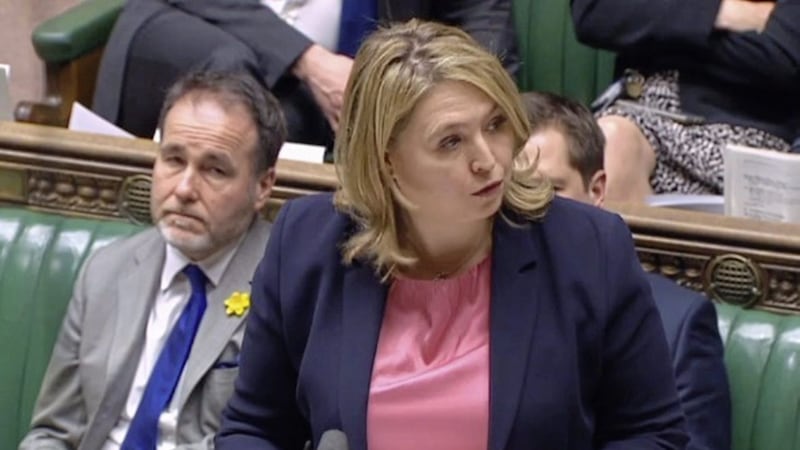When Karen Bradley ‘inadvertently’ made her gormless and still inexplicable declaration that security forces who killed here were ‘fulfilling their duty in a dignified and appropriate way’, it apparently took Dame Nuala O’Loan’s outrage to galvanise Labour protests.
Then criticism rained on Bradley, even before it turned out that there was nothing ‘inadvertent’ about what she said. Giving security force killers immunity had been on her to-do list for months.
She has now eaten hunks of humble pie, presumably with a hefty legal steer that no matter how she grovels there may well be consequences. As to her previous thinking out loud? Um. But she eventually declared that ‘evidence of wrongdoing should be pursued without fear or favour’. And what she said last week? She doesn’t ‘believe’ that.
It needs to be constantly re-stated that paramilitary groups came into existence to kill and destroy, and the role of state forces is to keep the peace and uphold the law. Educating Bradley may be a lost cause. The distinction between what should be expected of the state’s forces and paramilitaries is usually lost on the DUP and occasionally on other unionists, though Mike Nesbitt and Doug Beattie were commendably quick with Bradley criticism. Beattie also noted that she ‘should have been alive to the fact that an announcement is due on whether or not former soldiers should be prosecuted in relation to Bloody Sunday.’
Establishing the innocence of the Bloody Sunday dead in official minds was slow and painful. Bradley’s is the most blatant effort in years to rewrite history, flying in the face of that apology from David Cameron.
As each new secretary of state arrives the NIO should produce their copies of Lost Lives, the widely respected chronicle of the Troubles dead. Its statistics and narrative provide context. Bradley’s weirdly wrong ‘dignified and appropriate’ calls up a whole series of killings. But the soldiers given life sentences for stabbing two Fermanagh farmers to death in 1972 stand out.
From a regiment that had lost four members in their first three months on duty, a four-man patrol said they questioned Michael Naan and Andrew Murray about the killing of a local UDR soldier. Their staff sergeant then stabbed the men a total of 32 times. An officer ‘decided for the good of the army and the regiment it must never go any further.’
Lost Lives has a total of 189 civilians killed by security forces – which does not include those killed by off duty police or soldiers involved as loyalist paramilitaries, as in the Glenanne gang or the Miami Showband ambush.
Of the 189, nineteen were under the age of 16. The youngest was Patrick Rooney, aged 9, killed on August 15 1969 by RUC machine-gun fire through a bedroom wall in Divis Flats. It was an unjustified shooting, said the (British government-established) Scarman Tribunal.
The oldest civilian killed was 86-year-old Patrick Donaghy, shot by army bullets on April 17 1972, through a window of his flat in Divis Tower.
Soldiers gave evidence to Mr Donaghy’s inquest that while covering for engineers removing barricades, they fired at a window where they saw gun-smoke. The home help who found the 86-year-old dead next day said he only had one eye and instead of going to Mass walked back and forth past the window daily while saying the Rosary. The coroner told the jury they might think it unlikely a person would shoot from his own window and probable that gunmen had entered the flat.
Lost Lives records on Patrick Rooney that the RUC machine gun fire came when armoured Shorland vehicles were ordered into the Falls after the killing of 26-year-old Herbert Roy, Protestant, married, father of one, shot at the corner of Dover Street and Divis Street at about 12.30am. He was ‘the first victim of republicans in the troubles, dying from a gunshot wound to the chest amid rioting involving Protestant and Catholic crowds.’ Mr. Roy was also the first of eight to die in ‘disturbances’ which ‘led to the historic decision to send troops on to the streets of Northern Ireland.’
The youngest and oldest civilians killed by the security forces have a small, sad distinction but their killers, like others, were never charged.
How many soldiers and others died as a result of unjustified security force killings, perhaps especially Bloody Sunday? Treating them differently not only undermined the law. It had prolonged violent consequences. The net effect of governments playing down security force killings was to keep the Troubles going.








